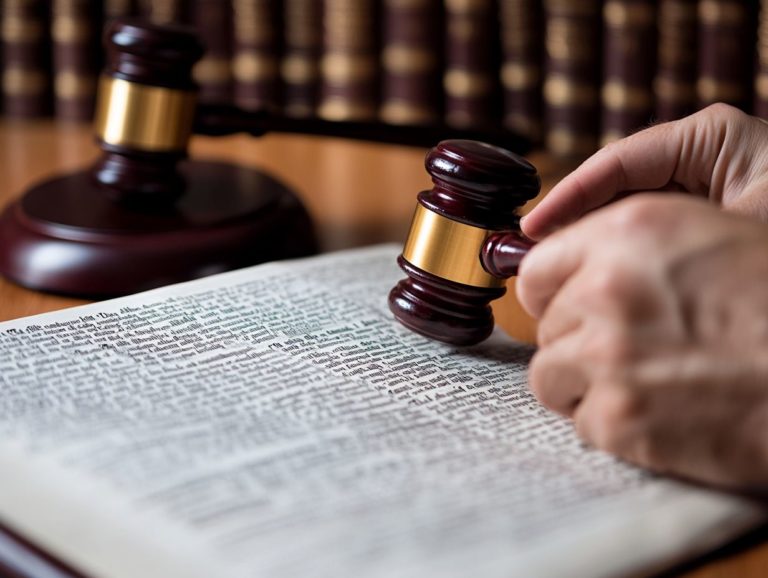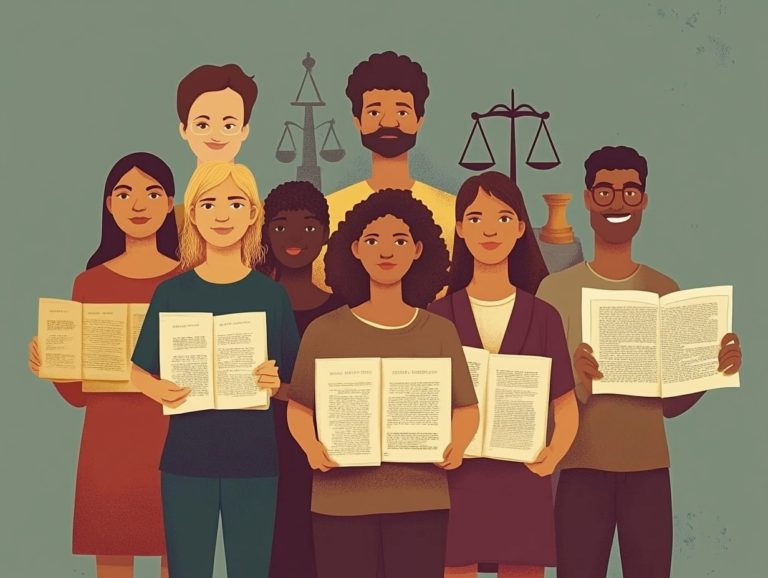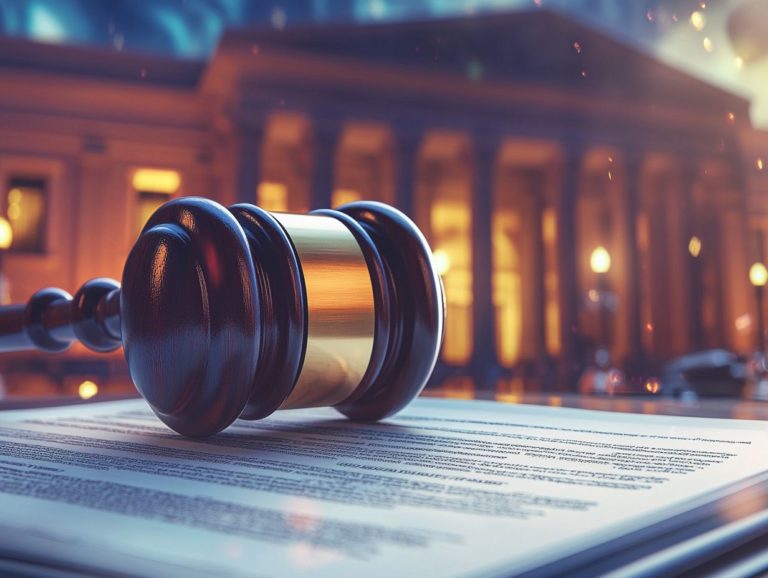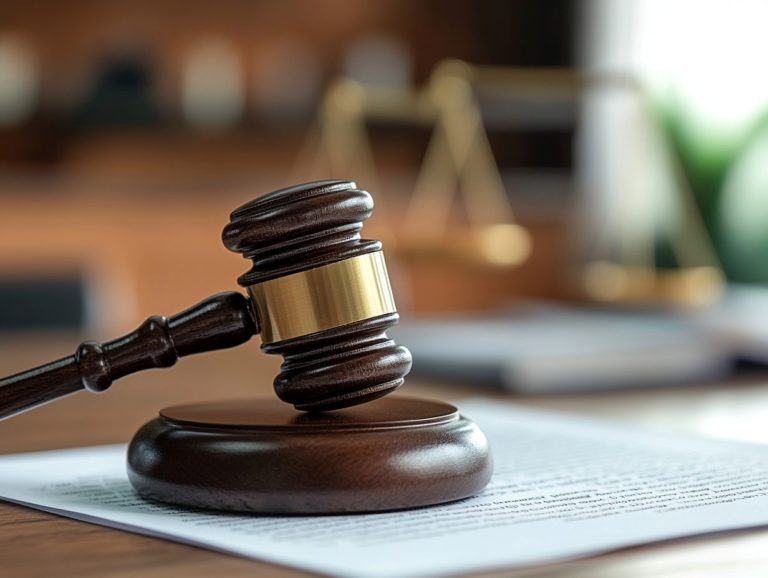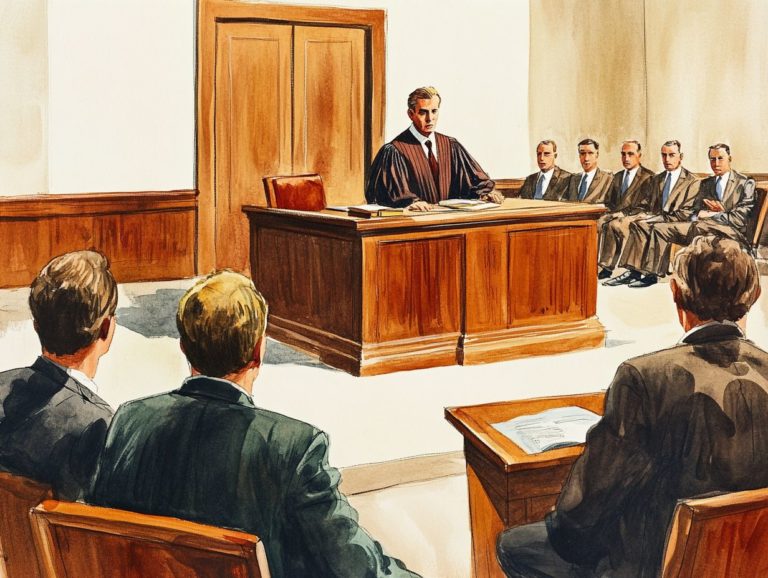Understanding the Right to Speedy Trials
The right to a speedy trial is a cornerstone of justice. It ensures you are not left with long waits while awaiting your day in court.
Let s dive into what a speedy trial really means! We will explore its definition, its constitutional foundations, and the historical context that has shaped it over time. You ll learn about the various factors that affect timely justice and understand its importance in protecting defendants rights.
You ll also find a discussion on the challenges that come with enforcing this right.
In addition, we ll compare international standards, giving you a broader perspective on how different countries uphold this fundamental right. Join us in exploring the significance of speedy trials in maintaining a fair legal system.
Contents
- Key Takeaways:
- Overview of the Right to Speedy Trials
- Constitutional Basis for the Right
- Factors that Affect the Right to Speedy Trials
- Importance of the Right to Speedy Trials
- Challenges in Enforcing the Right to Speedy Trials
- International Standards and Practices
- Frequently Asked Questions
- What is the right to speedy trials?
- What is the purpose of the right to speedy trials?
- How is the right to speedy trials protected?
- What factors determine whether a person’s right to a speedy trial has been violated?
- Can a person waive their right to a speedy trial?
- What happens if a person’s right to a speedy trial is violated?
Key Takeaways:
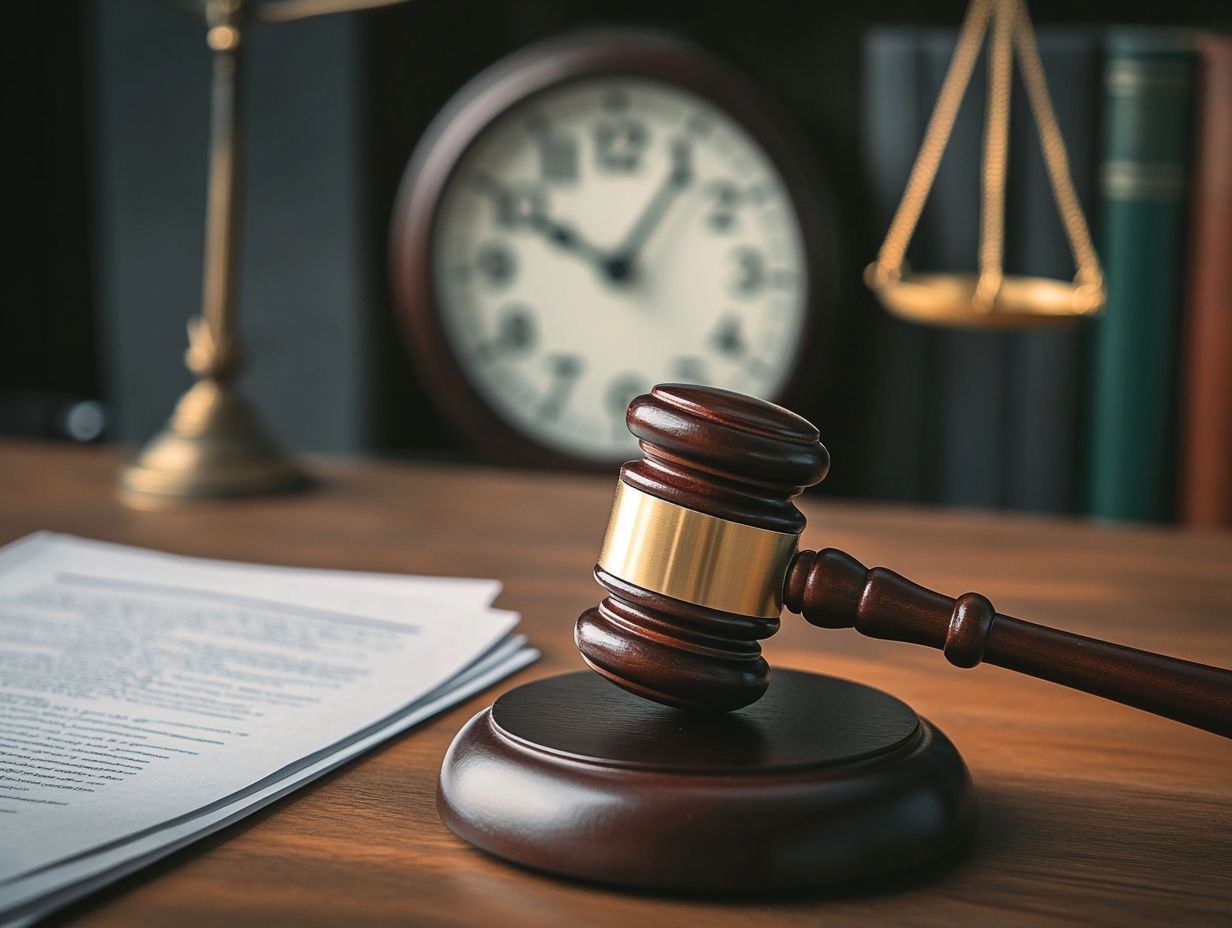
The right to speedy trials is a fundamental legal concept that aims to protect defendants’ rights and ensure efficiency in the justice system. Factors such as pre-trial detention length, case complexity, and resource availability can impact the enforcement of this right. International standards and practices offer insight into the challenges and potential solutions for enforcing the right to speedy trials.
Overview of the Right to Speedy Trials
The right to a speedy trial is a crucial principle enshrined in the Sixth Amendment of the United States Constitution. This provision protects you from long waits when facing criminal charges and ensures that your due process rights are respected.
This constitutional guarantee is vital for maintaining the fairness of the criminal justice system. It requires federal courts to follow specific time limits in prosecuting cases. By promoting timely justice, it helps minimize the negative effects of court delays on defendants like you.
Explanation of the Concept
The concept of a speedy trial is rooted in the principle that you, as a defendant, have the right to see your case resolved quickly. This not only safeguards your due process rights but also lessens the emotional and financial burdens associated with drawn-out legal battles.
This idea is particularly critical in criminal justice, where delays can seriously threaten the integrity of evidence and the reliability of witnesses.
Courts strive to balance trial timelines with careful judicial discretion, aiming to establish reasonable time frames that meet the needs of both the prosecution and the defense. When timelines exceed statutory limits, the consequences can be serious: charges may face mandatory dismissal, protecting your rights as the accused.
Understanding the implications of these delays highlights the essential role that efficient judicial processes play in maintaining justice. Any violation of this right could lead to significant miscarriages of justice, emphasizing the need for timely resolutions.
Constitutional Basis for the Right
Your right to a speedy trial is primarily anchored in the Sixth Amendment of the United States Constitution. This essential part of the Bill of Rights guarantees you a speedy and public trial, establishing a crucial framework for ensuring fair legal proceedings.
Legal Framework and Historical Context
Legal frameworks supporting your right to a speedy trial have evolved significantly over time. Important cases like Barker v. Wingo highlight the need for clear statutory provisions, outlining the criteria for determining whether a delay infringes on your rights.
The Speedy Trial Act establishes a balance between your rights as a defendant and the demands of the judicial system. This legislation ensures you receive timely hearings while also considering practical constraints faced by the courts.
Landmark decisions that establish balancing tests for delays illustrate how courts interpret undue delays and their impact on fair trials. By exploring historical precedents, you can gain a deeper understanding of how statutory provisions strive to uphold justice without undermining the integrity of legal proceedings.
Factors that Affect the Right to Speedy Trials
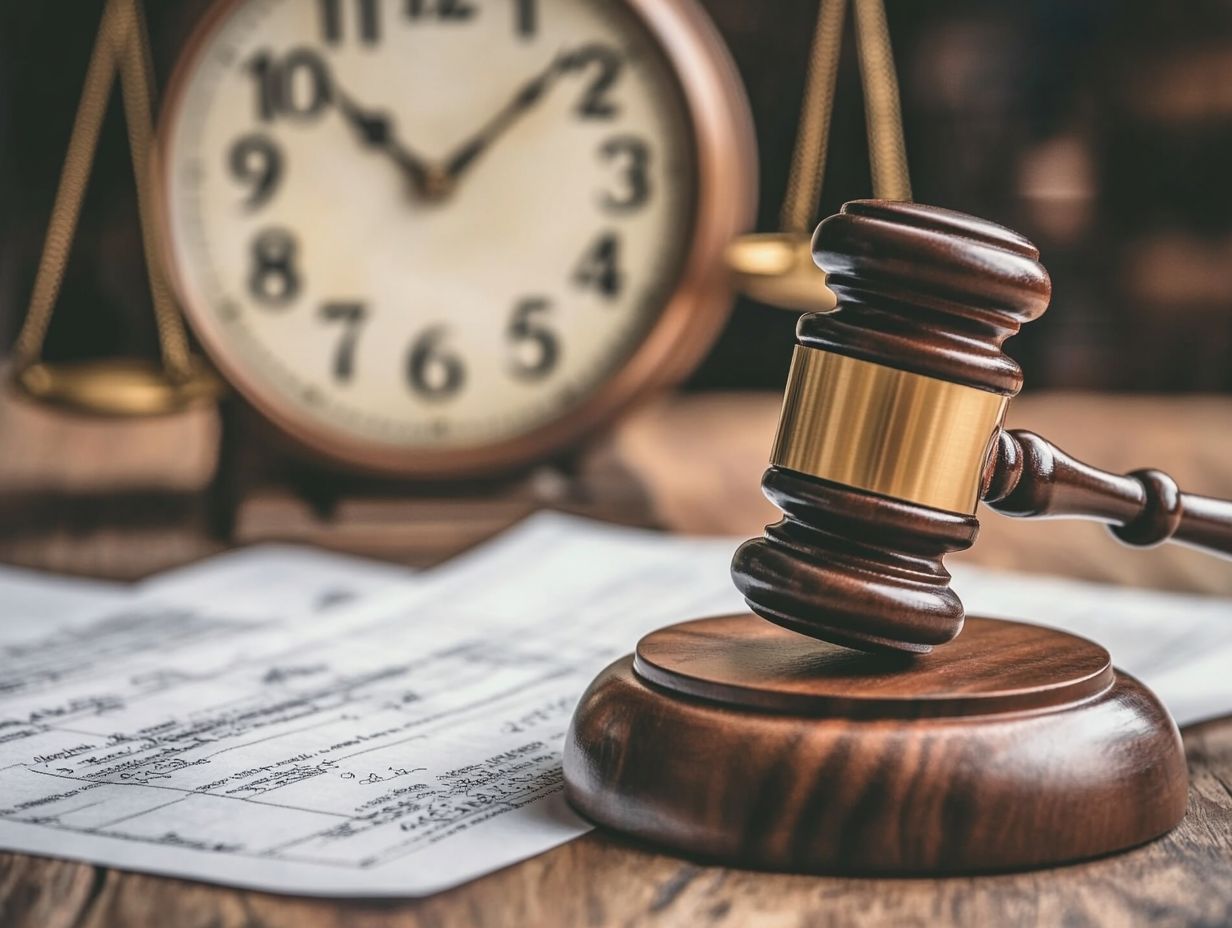
Several factors can profoundly impact your right to a speedy trial. These include statutory time limits, the specifics of pretrial detention, and various delays that may surface throughout the legal process.
Each of these elements can shape the strategies employed by both the prosecution and the defense.
Length of Pre-Trial Detention
The duration of your pre-trial detention can profoundly affect your right to a speedy trial. When detention drags on, it may compromise your due process rights and hinder the development of an effective defense strategy.
Extended periods of detention before trial significantly diminish your ability to secure adequate legal representation. This often leads to rushed or poorly prepared defenses, resulting in outcomes that are less than favorable.
The defense team must navigate a complex legal maze under pressure, making it challenging to gather evidence or witness testimonies effectively.
Indefinite detention can pressure you into making quick choices, such as pleading guilty just to avoid more time in jail. This undermines your right to a fair trial and compromises the very essence of justice itself.
Complexity of the Case
The complexity of a case can introduce significant variables that impact your right to a speedy trial, necessitating that both prosecution and defense strategies adapt to meet the demands of timely justice.
For instance, the careful collection of evidence often means the prosecution must sift through extensive documentation, scientific tests used to gather evidence, and expert testimonies all of which require time to assemble effectively.
Your defense team may need to investigate alternative narratives and gather corroborative evidence, making their timelines contingent on witness availability. Balancing thoroughness and speed can lead to negotiations and strategic maneuvering, with both sides aiming to ensure justice is served while being acutely aware of the ticking clock.
The complexities of your case remind us that the pursuit of a swift resolution demands diligence and adaptability from everyone involved.
Availability of Resources
The availability of resources within the judicial system is pivotal in shaping the efficiency of trial proceedings. When legal representation or court resources fall short, significant delays can cause serious issues in the administration of justice.
These limitations can hinder both the prosecution and defense, creating a domino effect that perpetuates inefficiencies. If public defenders are overwhelmed due to inadequate funding, they often lack the time and resources to build robust defenses, putting defendants at a distinct disadvantage.
Prosecutors facing similar constraints might struggle to present comprehensive cases, potentially overlooking key evidence that could expedite trials.
Such imbalances not only stall court proceedings but also infringe upon your right to a speedy trial, raising serious questions about the overall integrity of the criminal justice system.
Importance of the Right to Speedy Trials
The right to a speedy trial is critically important, serving as a vital safeguard for defendants’ rights.
It ensures that individuals are not ensnared in unjust delays that could compromise their constitutional guarantees and the foundational principles of due process within the criminal justice system.
Protection of Defendants’ Rights
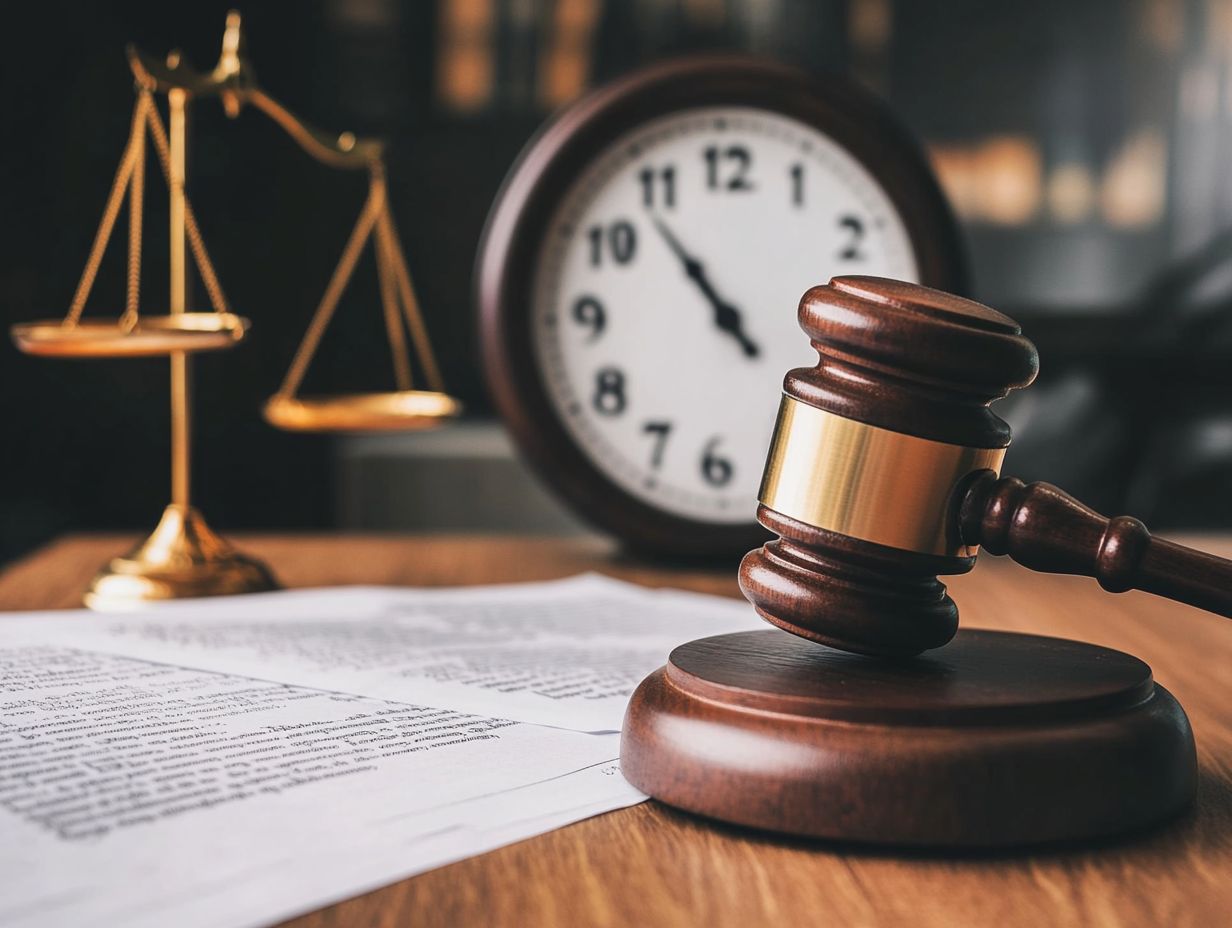
The right to a speedy trial is crucial for safeguarding your rights as a defendant. It ensures you have timely access to legal representation and clarity about your criminal charges.
This fundamental right streamlines the judicial process. It also eases the emotional strain of waiting for your trial.
Extended delays can escalate anxiety and fear. This makes it hard to work effectively with your legal counsel.
Prolonged uncertainty can negatively affect your personal relationships and mental health. It can diminish your ability to build a strong defense.
By speeding up the trial process, the justice system prioritizes your emotional well-being. It fosters a fairer approach to legal proceedings, ensuring you aren t left in limbo.
Efficiency of the Justice System
Your right to a speedy trial is key for the justice system’s efficiency. It minimizes court delays and promotes timely justice.
When cases are resolved quickly, it alleviates the backlog in courthouses. This ensures resources are used effectively.
Swift proceedings build public confidence in the legal system. They show that justice is a practical reality, not just an ideal.
Delays can lead to increased costs and emotional distress for everyone. Following these mandates strengthens fairness and accountability.
Challenges in Enforcing the Right to Speedy Trials
Enforcing the right to speedy trials presents challenges. Judicial discretion, court delays, and limited resources can complicate timely resolutions.
These obstacles make it harder to navigate the legal landscape. They can delay justice, which should not happen.
Obstacles and Solutions
Identifying obstacles to speeding up trials is essential. This helps develop effective solutions to streamline court processes.
In many areas, case backlogs are a significant barrier. They often lead to delays that undermine your right to a timely hearing.
Insufficient resources, like a shortage of judges and funding for public defenders, worsen this issue. This creates prolonged uncertainty for both defendants and victims.
Addressing these challenges requires a multi-faceted approach. Advocating for increased budgets can help hire more personnel.
Implementing case management systems that prioritize urgent matters is also crucial. Exploring alternative dispute resolutions can ease the court’s burden and speed up resolutions.
International Standards and Practices
International standards for the right to a speedy trial show a growing recognition of timely justice as a human right.
Many countries are adopting frameworks similar to those in the U.S. legal system. This reflects a global commitment to serving justice promptly.
Comparison with Other Countries
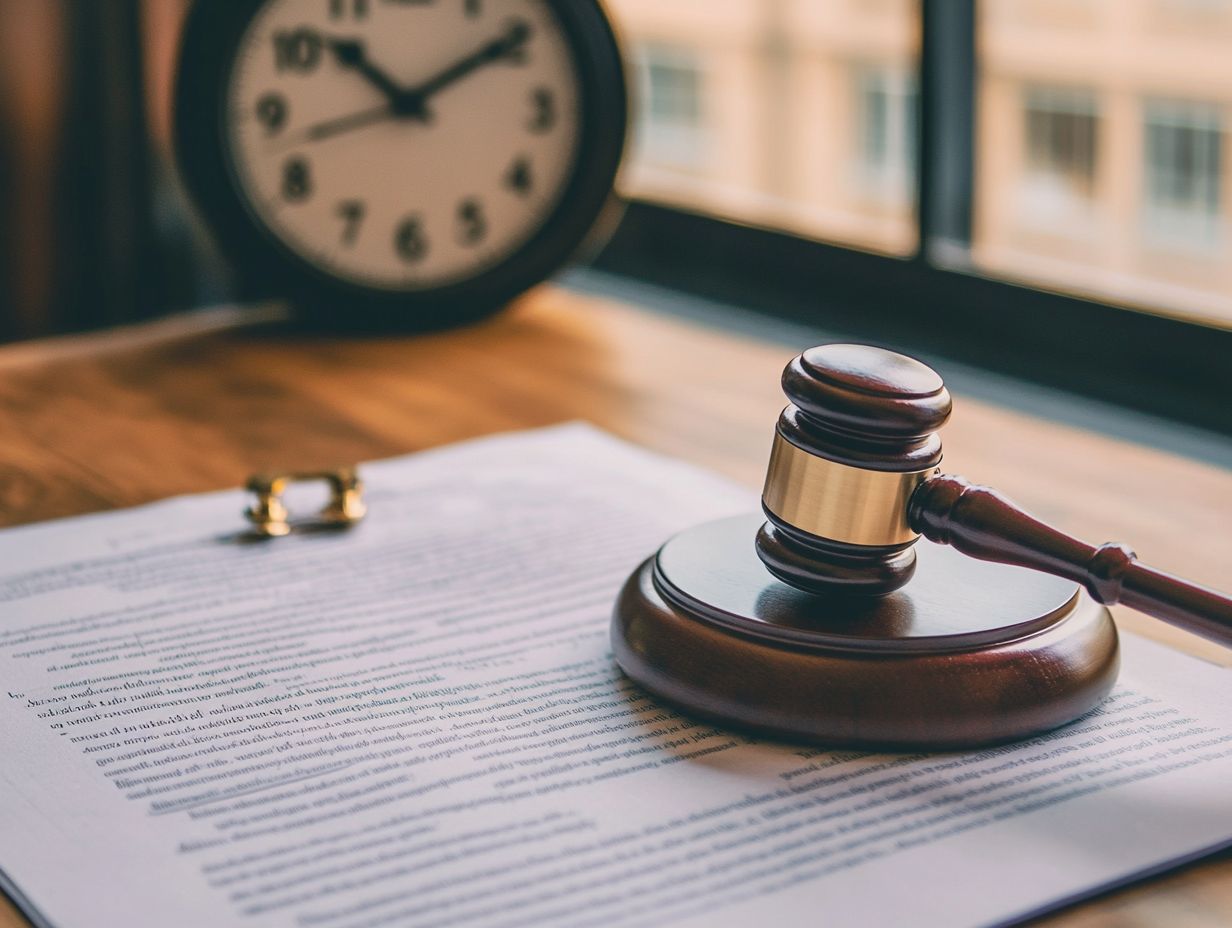
Comparing the right to a speedy trial across different countries shows different legal systems that can inspire enhancements in the U.S. system. It also sheds light on global human rights standards.
Take Canada and Germany, for example. These nations prioritize timeliness in their judicial processes, supported by legal mandates that ensure swift trials to uphold defendants’ rights.
Brazil has high incarceration rates and prolonged pre-trial detentions, raising significant concerns about due process and access to justice.
Japan emphasizes reconciliation and timely resolution, presenting a compelling model for reform.
Explore these diverse approaches! You can gain a deeper understanding of how different societies balance delivering justice and honoring the right to a fair and prompt trial.
Frequently Asked Questions
What is the right to speedy trials?
The right to speedy trials is a constitutional guarantee for a person accused of a crime. It ensures that the government must bring charges and hold a trial within a specific period after the person is arrested or charged.
What is the purpose of the right to speedy trials?
The purpose of the right to speedy trials is to protect individuals from undue and prolonged pre-trial detention. It also ensures a fair and efficient criminal justice system.
This right helps prevent the deterioration of evidence and witness testimony, which could impact the trial’s outcome.
How is the right to speedy trials protected?
The right to speedy trials is protected by the Sixth Amendment of the U.S. Constitution, which guarantees a speedy and public trial by an impartial jury. State laws and court rules also establish time limits for various stages of the criminal justice process.
What factors determine whether a person’s right to a speedy trial has been violated?
No specific time frame qualifies as a violation of the right to speedy trials. Instead, courts consider several factors, such as the length of delay and the reason for the delay.
Other factors include prejudice caused to the defendant and the complexity of the case, along with the defendant’s actions.
Can a person waive their right to a speedy trial?
Yes, a person can waive their right to a speedy trial by voluntarily agreeing to a delay. This may occur if the defendant needs more time to prepare their defense or is negotiating a plea deal with the prosecution.
What happens if a person’s right to a speedy trial is violated?
If a person’s right to a speedy trial is violated, they may file a motion to dismiss the charges against them. If granted, the charges will be dropped, and the person will be released from custody.
However, if denied, the trial will proceed as planned.
Understanding your rights can empower you get informed today!
In conclusion, the right to a speedy trial is vital for ensuring justice is served efficiently. Reflecting on its significance can help individuals navigate legal challenges.


